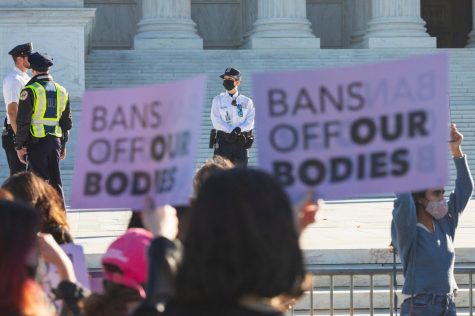Texas and Supreme Court Debate on Women’s Bodies
November 19, 2021

If you have read the first article I have written (“The Pro-Life Argument in Texas”), you understand and are fully aware of my personal opinion on this topic. But if you have not, I will happily remind you: on September first, the Texas government banned abortions after six weeks of pregnancy and it is a war on women. The law, SB8, at hand would not allow abortions after six weeks of pregnancy in the state of Texas. Six weeks of pregnancy is barely detectable for most women; much of the time, women don’t even know they are pregnant until at least eight weeks. And not only that, but this law also allows for private citizens from quite literally anywhere in the world to file a lawsuit against any doctors or woman they believe to have aided in, received, or performed an abortion. In these civil lawsuits, if the accused is found guilty, the accuser could win up to ten thousand dollars as a reward. It is straight-up fucked, I know. People can monetarily profit from controlling someone else’s body, potentially ruining their entire life in the process.
About a week ago, the Supreme Court did not officially block this most restrictive abortion law in the country. They did, however, schedule a hearing on November 1st to discuss its future. The hearing lasted a full three hours and heard the two most important sides of this argument: the Justice Department and the abortion providers in Texas. The debate resulted in a loophole in the system for abortion providers, rather than completely blocking the law. Abortion providers in Texas can challenge the law when necessary. So, what does this mean, exactly? It means that the law was not explicitly defined as unconstitutional or constitutional; it rides right in the middle. It means instead of making a true decision about whether controlling women’s bodies was right or not, the Supreme Court passed that responsibility onto the lower state courts. It also means that the law will not be temporarily blocked while it pends further investigation. Justice Barrett had argued that law was made to stop the providers from “presenting a full constitutional defense”. She also explained that ”providers could adequately challenge the law by violating it, getting sued, and defending themselves by arguing that the law is unconstitutional”. This law is confusing, and – more importantly – it’s complete and utter bullshit. It sure says a lot about the United States Supreme Court and where they stand on making these controversial decisions.
But how easy are these “challenges” going to be to win? And what happens if the providers lose? Based on what has already happened with this issue, it is clear that it will be a tough process to go through, and one that will be difficult to win. As for the second question, it wasn’t officially discussed during the debate. Will they lose their jobs? Will they simply just be sued? Can they be arrested? What are the consequences for the actual patient? Those are some important questions that must be answered soon before someone risks everything for a fight they may not even win. On the opposite side, what if they do win? Will they just not get sued and get their money back? Or will it pend more further investigation about the law at hand? As of the hearing, it is unclear, and probably will remain unclear, until it happens. The ruling seems to be so underthought-out – almost as if it wasn’t really planned out at all. The court had made a sort of compromise, trying to make both sides satisfied with the result. But it feels like the defendant is getting the better deal. They didn’t discourage the law, they didn’t even block it. All they said was that someone can argue against it, and they can decide whether to enforce it again after that. It’s bullshit.
Texas is not the first state to attempt this kind of law – eleven out of the fifty states had previously put a six-week ban on abortions but were blocked by the Federal Justice System, making Texas the only state to enforce such a law. So, what’s the difference between the Texas law and the other states’ laws? It’s the way it’s written, believe it or not. The past abortion bans had been written by someone working directly with the state (like an attorney general, for example). While, according to CBS News, the Texas “law allows private citizens, rather than state officials, to enforce the law through suits filed in state court, and critics of the measure argue the structure has insulated it from federal court review.” It is the only abortion law – and only law in general – that allows for non-government officials to enforce it. This creates an extremely lawful issue. The Intercept explains: “if there’s no state actor tasked with enforcing the law, then there is no clear defendant to sue to block it from taking effect”. Why women’s bodies seem to be every state’s business is baffling to me. Why what a woman does with her own body seems to be a controversial issue is even more baffling.
